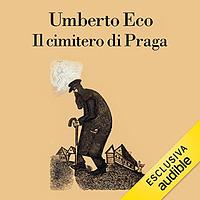You need to sign in or sign up before continuing.
Take a photo of a barcode or cover
dark
mysterious
reflective
tense
slow-paced
Peopled by such popular writers as Dumas, Hugo, and Zola as well as historical figures - among others - Garibaldi, Napoleon III, and Dreyfus, and driven by political forces charged by the activity of secret service provacateurs in later nineteenth century Europe, "The Prague Cemetery" lures us into Eco's spiritually ugly, hate-filled 'imagining' of how corruption and hateful lies gradually birthed "The Protocols of the Elders of Zion".
Meet Eco's wretch of a protagonist:
Simone Simonini ... opportunist ,
"Listening doesn’t mean trying to understand. Anything, however trifling, may be of use one day. What matters is to know something that others don’t know you know."
raging anti-semite,
"All I know about the Jews is what my grandfather taught me...he reminded me that the Jew, as well as being as vain as a Spaniard, ignorant as a Croat, greedy as a Levantine, ungrateful as a Maltese, insolent as a Gypsy, dirty as an Englishman, unctuous as a Kalmyk, imperious as a Prussian and as slanderous as anyone from Asti..."
master forger of official documents,
"Anyone falsifying documents must always be well informed, which is why I used to spend time in libraries. Libraries are fascinating places..."
agent-provacateur,
“A good secret agent is lost when he has to deal with something that has already happened. Our job is to make it happen first.
gastronome
"My stay in Sicily ends here, and I’m sorry I won’t see what is going on in Naples and beyond, but I wasn’t here to enjoy myself, nor to write an epic. At the end of these travels I remember with pleasure only the pisci d’ovu, the babbaluci a picchipacchi (a way of cooking snails), and the cannoli . . . Ah, the cannoli! "
murderer,
"...her eyes seem gradually to come out of their sockets, her tongue hangs swollen from her mouth, I hear a last breath, then her body slumps lifeless."
and finally the bearerer of a horribly painful truth...
"even Simone Simonini, although in effect a collage, a character to whom events have been attributed that were actually done by others, did in some sense exist. Indeed, to be frank, he is still among us."
⭐A star for Mr Eco's writing... brilliant as always.
⭐A star for the historical research which leaves me with a desire to dig deeper.
Too spiritually ugly to even think about recommending to anyone I care about. I get the point of this work Mr Eco, but many will not. And to my mind, what has come to life within these pages can die there.
Meet Eco's wretch of a protagonist:
Simone Simonini ... opportunist ,
"Listening doesn’t mean trying to understand. Anything, however trifling, may be of use one day. What matters is to know something that others don’t know you know."
raging anti-semite,
"All I know about the Jews is what my grandfather taught me...he reminded me that the Jew, as well as being as vain as a Spaniard, ignorant as a Croat, greedy as a Levantine, ungrateful as a Maltese, insolent as a Gypsy, dirty as an Englishman, unctuous as a Kalmyk, imperious as a Prussian and as slanderous as anyone from Asti..."
master forger of official documents,
"Anyone falsifying documents must always be well informed, which is why I used to spend time in libraries. Libraries are fascinating places..."
agent-provacateur,
“A good secret agent is lost when he has to deal with something that has already happened. Our job is to make it happen first.
gastronome
"My stay in Sicily ends here, and I’m sorry I won’t see what is going on in Naples and beyond, but I wasn’t here to enjoy myself, nor to write an epic. At the end of these travels I remember with pleasure only the pisci d’ovu, the babbaluci a picchipacchi (a way of cooking snails), and the cannoli . . . Ah, the cannoli! "
murderer,
"...her eyes seem gradually to come out of their sockets, her tongue hangs swollen from her mouth, I hear a last breath, then her body slumps lifeless."
and finally the bearerer of a horribly painful truth...
"even Simone Simonini, although in effect a collage, a character to whom events have been attributed that were actually done by others, did in some sense exist. Indeed, to be frank, he is still among us."
⭐A star for Mr Eco's writing... brilliant as always.
⭐A star for the historical research which leaves me with a desire to dig deeper.
Too spiritually ugly to even think about recommending to anyone I care about. I get the point of this work Mr Eco, but many will not. And to my mind, what has come to life within these pages can die there.
This is probably more of a 3.5 for me, but I rounded up. This is the third of Eco's books that I have read and I think it might be the most readable but least accessible of the three. From what I could gather, I think this book is sort of like a Forrest Gump of the second half of the 19th century. The main character becomes involved in several historical events, however I am just not familiar enough with this period in European history to really appreciate it. I did enjoy reading it though, and it has a frame story, which, I LOVE a good frame story. I'd recommend for fans of Eco or European history buffs.
challenging
dark
informative
mysterious
medium-paced
Plot or Character Driven:
A mix
Strong character development:
Yes
Loveable characters:
Complicated
Diverse cast of characters:
No
Flaws of characters a main focus:
Yes
Graphic: Antisemitism
This was definitely an Umberto Eco book. As such, it takes a little while to get going, and it's convoluted as hell and probably in need of a bit more editing. Once you've gotten used to its idiosyncrasies, however, it's a fascinating examination of both late 19th century Western European history, and the universal human urge to create conspiracy theories and invent shadowy enemies (in this case, the Freemasons, the Jesuits, and ultimately the Jews). For a novel about a forger, the book is itself a sort of forgery, pulling together many different real people and historical events into a single fictional autobiographical narrative of espionage and madness. The subject matter is far from pleasant, and often ventures into the abhorrent - the main character Simonini is a massive bigot and snob. and the characters of the book freely express intensely and frighteningly anti-Semitic ideas, with no counterbalance. The novel explicitly foreshadows the "Final Solution" which would later result from the hatred of Jews encouraged by this culture and written works such as the Protocols of the Elders of Zion. It's an ugly portrait of an ugly period in human thought, but a fascinating portrait nonetheless.
I was very disappointed with this one! I love Umberto Eco but this didn't catch my attention the way NotR and Baudolino did. I thought the social commentary was a little heavy handed and the characters weren't my favorite. However, the premise and the plot were interesting enough to finish.
Similarly to what many others have reported, the first 100 pages or so were a bit of a struggle for me. I had found the book in a book case and since I loved 'The Name of the Rose' I felt lucky to find another book of his for free. I just started reading, without knowing much about the book, so this rambling on food and why the guy hates this or that... well, I didn't see the point at all. I guess the only thing that kept me going was trust that Eco must have had a higher agenda in all this (and I was at least slightly interested in the mystery).
But at some point it started to make at least a little bit of sense. The idea that words, even though completely fabricated, could create worlds and change the cause of real events - now that was interesting. I have to admit that my knowledge of 18th century history is rather limited, so I think I missed out on many other aspects that would make the book an interesting read; but I certainly feel like I've learned quite a bit in other respects. This book came a long way in convincing me that maybe there really is a point to postmodern shenanigans.
But at some point it started to make at least a little bit of sense. The idea that words, even though completely fabricated, could create worlds and change the cause of real events - now that was interesting. I have to admit that my knowledge of 18th century history is rather limited, so I think I missed out on many other aspects that would make the book an interesting read; but I certainly feel like I've learned quite a bit in other respects. This book came a long way in convincing me that maybe there really is a point to postmodern shenanigans.
mysterious
tense
slow-paced
Plot or Character Driven:
Plot
Strong character development:
No
Loveable characters:
No
Diverse cast of characters:
No
Flaws of characters a main focus:
Yes
For once, Umberto Eco may have failed. I've heard he wanted Captain Simone Simoni to be the most unlikeable protagonist in the history of literature.
I like the old bastard. He was a bigot, a chauvinist, and an elitist snob, but he took pride in his work. He was a master at creating chaos, sowing doubt and just making up his evidence as he went along. He's the avatar of intellectual dishonesty and enlightened self-interest.
Simoni is the poster boy for the modern era where we have learned that you have to get your news from multiple sources so that you can compare the lies of your enemies with the lies of your allies, not so much to discover the truth but as to fortify your own intellection position on politics and current events.
If he were alive today, he'd be working for CNN and Fox News, grousing because the Huffington Post was stealing his lies.
He's a terrible person, but you can find a dozen men just like him by switching on any cable news channel.
Simoni's story frankly was less interesting than the glimpses of real history Eco used as framework. I was a little disappointed Masons and Rosicrucians were used as bogeymen in the story by people creating political conspiracies but their own internal feuds of the era weren't touched upon. I was amazed that the Martinists weren't even mentioned as Paris was their city. But I also get that the idea of the secret orders was more important than their actual history, in much the same way the idea of political intrigue was more important than the actual events.
I took The Prague Cemetery as a tongue-in-cheek fable about a certain type of person and the influence they've had on intellectual and political history. Perhaps it could also be a warning for our times.
Today, perhaps more than ever, when you see the right scapegoating one group and the left another, you should stop and ask yourself who's getting paid?
I like the old bastard. He was a bigot, a chauvinist, and an elitist snob, but he took pride in his work. He was a master at creating chaos, sowing doubt and just making up his evidence as he went along. He's the avatar of intellectual dishonesty and enlightened self-interest.
Simoni is the poster boy for the modern era where we have learned that you have to get your news from multiple sources so that you can compare the lies of your enemies with the lies of your allies, not so much to discover the truth but as to fortify your own intellection position on politics and current events.
If he were alive today, he'd be working for CNN and Fox News, grousing because the Huffington Post was stealing his lies.
He's a terrible person, but you can find a dozen men just like him by switching on any cable news channel.
Simoni's story frankly was less interesting than the glimpses of real history Eco used as framework. I was a little disappointed Masons and Rosicrucians were used as bogeymen in the story by people creating political conspiracies but their own internal feuds of the era weren't touched upon. I was amazed that the Martinists weren't even mentioned as Paris was their city. But I also get that the idea of the secret orders was more important than their actual history, in much the same way the idea of political intrigue was more important than the actual events.
I took The Prague Cemetery as a tongue-in-cheek fable about a certain type of person and the influence they've had on intellectual and political history. Perhaps it could also be a warning for our times.
Today, perhaps more than ever, when you see the right scapegoating one group and the left another, you should stop and ask yourself who's getting paid?
I'm writing this on my phone in the airport so this is going to be terse: I thought that Foucaults Pendulum was boring in parts; Ecos return to The Grand Conspiracy novel is downright dry. There are some occasional flashes of something going on here but for the most part it feels purely mechanical and devoid of any kind of life of its own.




